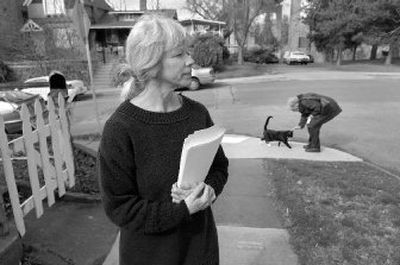Neighbors upset because 17-story tower looms again

Fearing a lawsuit, Spokane leaders are reconsidering a controversial condominium tower on the embankment overlooking Peaceful Valley.
The 17-story Riverview on Riverside tower and adjacent townhouses were scrapped last year by the city’s hearing examiner. The tower would be accessible from Peaceful Valley, while townhouses would front Riverside Avenue. A courtyard would separate the buildings.
Riverview developer Mick McDowell and some downtown business owners and residents note that the land is in the city’s core. They say it will bring dozens of new dwellers who will help clean up downtown and revitalize the area.
But reconsideration of the proposal has reignited anger from Peaceful Valley residents who say the tower would create a shadow over their homes and cause the historic character of their neighborhood to fade.
“Because McDowell has money, he’s basically able to overthrow the city’s process,” said Lori Aluna, who lives about a block from the proposed tower. “That really frustrates me.”
McDowell says the city has cost him millions by changing development rules without informing him. He says his building won’t change the neighborhood any more than other townhouses and buildings that have gone up throughout Peaceful Valley.
“I’m not going to create anything that isn’t already starting and already happening,” McDowell said.
The Spokane City Council will consider a development agreement with McDowell at its April 2 meeting that would stop a lawsuit and allow McDowell to construct the project.
At issue are height limitations approved by City Council in 2002. Those rules restrict residential buildings to 35 feet on much of the land where McDowell hopes to construct the tower. The portion of his property where he plans to build townhouses along Riverside allows residential buildings to be 150 feet high.
McDowell said city officials never informed him they were considering new height rules in the area and argues they had an obligation to do so. Last year, McDowell asked city officials to allow him to violate the height regulations if he provided extra amenities in his project, such as improvements to the stairs that go from Riverside to Peaceful Valley.
But city Hearing Examiner Greg Smith ruled that the extras were not enough.
“The design appears to turn its back on Peaceful Valley and does not mitigate the negative effects of the increased height on adjacent properties,” Smith wrote in his decision. “If this tower is approved then it sets precedent for future similar projects. In that case, the height restrictions found in the (building) code essentially go away and the reasons for enacting them in the first place will not be realized.”
McDowell appealed the decision to Superior Court and filed a $7 million claim against the city. He argues that the city’s height codes don’t make sense because rules would allow him to build the same tower if he filled it with offices. Rules also allow him to build it along Riverside – where it would cast an even longer shadow on the valley because it would be higher up the embankment.
City rules forbid the project from casting shadows on parks. The city’s planning department last year recommended that the top four floors be cut from the project because studies indicated it would cast a shadow over Glover Field during part of the winter. The proposed development agreement, however, flatly states that the building “will not increase the amount of shading of public parks and open space.”
City officials say the city is at risk of losing the lawsuit and potentially having a judge rule in favor of the development without McDowell having to build extra amenities that he’s agreed to in the proposed agreement.
“He has a good case and I think we need to mitigate that before it gets worse,” said Councilwoman Nancy McLaughlin.
The current proposal is the same as the one considered by the hearing examiner except it has more details about the improvements to the stairs and requires him to make a $7,500 donation to the proposed whitewater park.
Aluna questioned how the city attorney’s office could faithfully represent the city in the case since it already issued an opinion in the matter.
Last year, Assistant City Attorney Milt Rowland submitted a letter to the city’s hearing examiner that agreed with McDowell’s interpretations of the shading rules. Assistant City Attorney James Richman said the city’s economic development department asked the office for its interpretation.
Spokane’s Chief Operating Officer John Pilcher, who led the city’s economic development department at the time, said it’s not unusual for the department to ask attorneys for input on zoning issues when there’s confusion.
“If they see weaknesses or differences of interpretation of the code, I think that’s fair to put that down,” Pilcher said. “If that conflicts with the hearing examiner’s decision, we’ll have to sort that out at that time.”